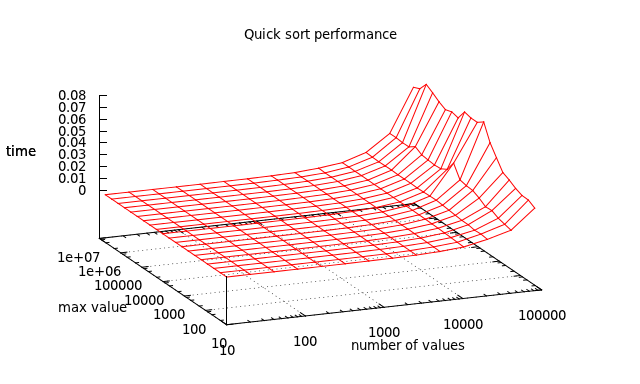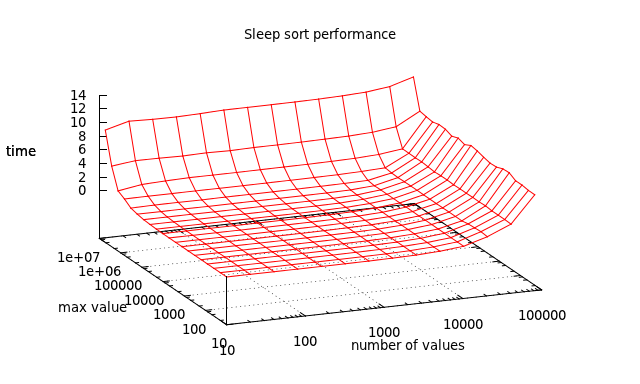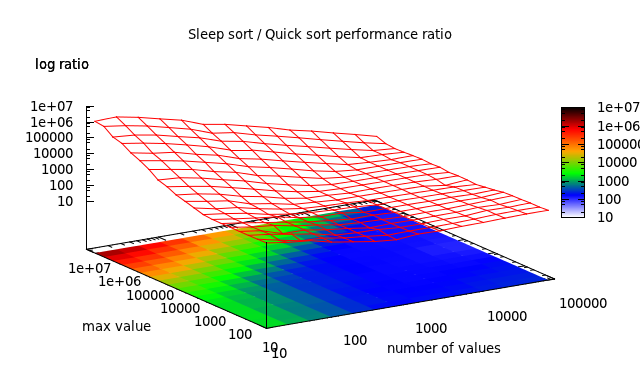Sleep sort performance test
By grapsus on Monday 25 July 2011, 01:38 - Permalink
Introduction
Sleep sort is a very curious and original algorithm. It brings several interesting questions. Such as, how to measure its complexity or in what cases does it perform the best.
Principle
In a nutshell: for each element to sort, start a thread or a process which sleeps a time proportional to the element and then pushes it back to the main thread.
Trivial Bash implementation:
1 2 3 4 5 6 7 8 9 10 11 12 | #!/bin/bash function f { sleep $1 echo $1 } while [ -n "$1" ] ; do f $1 & shift done wait |
Test suite
In order to study it and measure its performance we (me and Hartok) decided to implement the Sleep Sort in Python and gevent.
Our program generates a set of random numbers and sorts it with Sleep sort then with the Python built-in Quick sort and records timings. It works with three parameters:
- set size
- maximum value in the set
- the ratio between sleep time and values in the set (for example with 10 the thread for 42 sleeps for 42/10 seconds)
This last parameter is pretty tricky: the higher it is, the faster the Sleep sort works. But if it is too high, the time to start a new thread (or greenlet) will be more important than the sleep time for low values and the result will be incorrect. It seems to be strongly hardware dependent and a little tied to the other parameters.
1 2 3 4 5 6 7 8 9 10 11 12 13 14 15 16 17 18 19 20 21 22 23 24 25 26 27 28 29 30 31 32 33 34 35 36 37 38 39 40 41 42 43 44 45 46 47 48 49 50 51 52 53 54 55 56 57 58 59 60 61 62 63 64 65 66 67 68 69 70 71 72 73 74 75 76 77 78 79 80 81 82 83 84 | #!/usr/bin/python import sys import random import time import copy import gevent divisor = 900000 def sort(numbers): """ Sorts a list with Sleep Sort algorithm and measures time """ begin = time.time() def f(n, result): gevent.sleep(float(n)/divisor) result.append(n) result = [] greenlets = [] # spawn a sleep greenlet for each value for n in numbers: greenlets.append(gevent.Greenlet.spawn(f, n, result)) # wait for all greenlets to end gevent.joinall(greenlets) return (time.time()-begin, result) def systemsort(numbers): """ Sorts a list with system sort function and measures time """ begin = time.time() result = copy.copy(numbers) result.sort() return (time.time()-begin, result) def generate(n, m): """ Generates a list of n random numbers, each being less than m """ numbers = [] for i in range(n): numbers.append(random.randint(1, m)) return numbers if __name__ == '__main__': # read params try: n = int(sys.argv[1]) m = int(sys.argv[2]) except BaseException: print "usage: %s n m [d]" % sys.argv[0] print " - n number of random numbers" print " - m maximum random value" print " - d time divisor (optionnal), default is %d" % divisor sys.exit(1) try: divisor = int(sys.argv[3]) except: pass # generate random values numbers = generate(n, m) # sleep sort them (sleep_time, sleep_result) = sort(numbers) # system sort them (system_time, system_result) = systemsort(numbers) if system_result == sleep_result: print "sleep sort succeed" print "sleep: %f" % sleep_time print "system: %f" % system_time else: print "sleep sort failed (time divisor too ambitious ?)" print "sleep: (%d elements)" % len(sleep_result) #print sleep_result.__str__() print "system: (%d elements)" % len(system_result) #print system_result.__str__() errors = 0 for n in range(n): if system_result[n] != sleep_result[n]: errors = errors + 1 print "%d errors" % errors |
Test results



The overall performance of the Sleep sort is awful, but it has interesting performance when it comes to sets with few different values.
Comments
Well, the sleep sort's algorithm depends on the scheduler used. There's no magic involved.
Sure, the sorting is done when the scheduler determines the next runnable task, so it's really a regular Insertion Sort. We just wanted to implement it with gevent, which enables you to run more threads (as they're very light). The results are here for the lulz.
Grapsus, do you form part of the LulzSec hacktivist group ???
@Policeman Won't answer your question, but you got pwned by your IP, I know who you are...